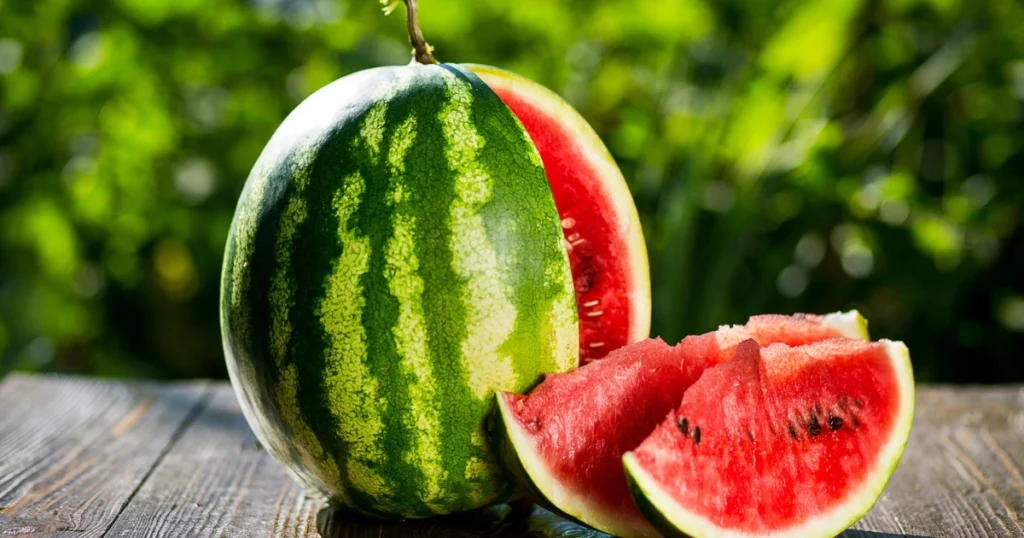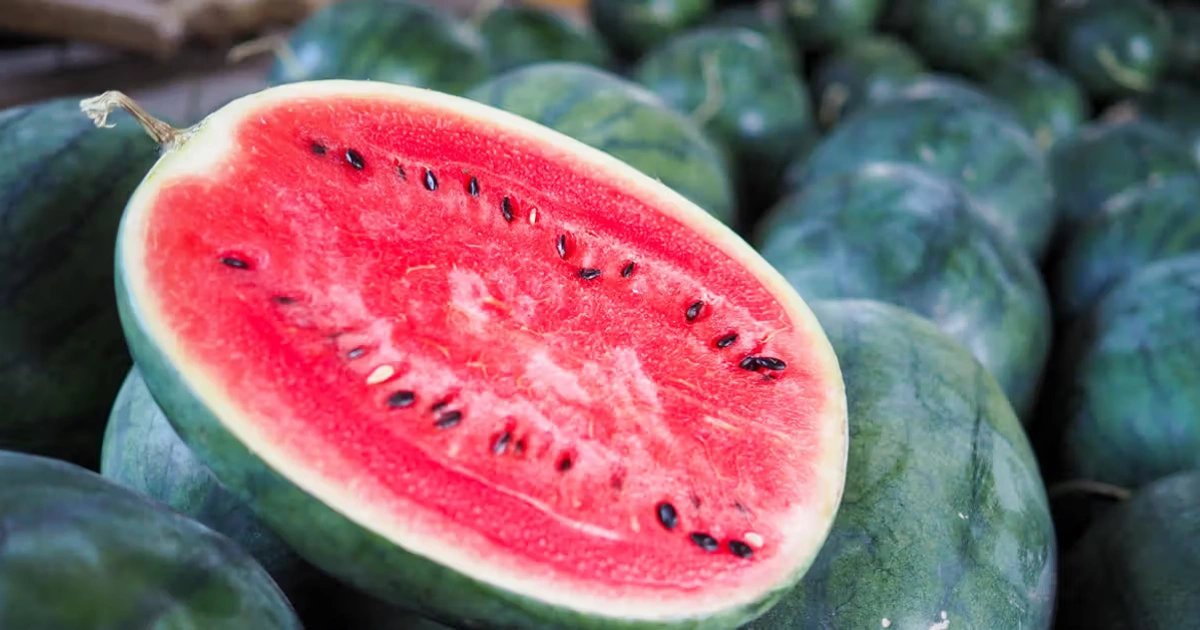Watermelon is often celebrated for its hydrating and refreshing qualities, especially in the heat of summer. But beyond its juicy red flesh, watermelon seeds hold a surprising array of nutrients that can support everything from heart health to glowing skin.
While many people discard the seeds, integrating them into your diet can offer a wealth of health advantages. Here’s what makes watermelon seeds worth keeping—and how to use them for maximum benefit.
Why Watermelon Seeds Are Good for You
Watermelon seeds are packed with essential nutrients such as magnesium, zinc, healthy fats, protein, and antioxidants. When consumed properly, they can contribute to your daily nutritional needs while offering additional therapeutic benefits.
Key Health Benefits of Watermelon Seeds
1. Supports Kidney Function
Watermelon seeds act as a gentle diuretic, which helps the body eliminate excess water and toxins. This supports kidney cleansing and can aid in flushing out impurities from the urinary tract.
2. Natural Diuretic Action
By stimulating urine production, these seeds help reduce fluid retention, contributing to detoxification and improved organ function.
3. Improves Digestion
With a good amount of fiber and healthy fats, watermelon seeds may support gut function, helping reduce bloating and promote regular bowel movements.
4. Provides Lasting Energy
Watermelon seeds contain protein and unsaturated fats, which help maintain steady energy levels throughout the day.
5. High in Magnesium
Magnesium is critical for muscle function, nerve transmission, heart rhythm, and bone health. A handful of watermelon seeds provides a notable portion of your daily requirement.
6. Promotes Healthy Skin
Rich in antioxidants, including vitamin E, watermelon seeds help protect the skin from oxidative stress, which can lead to premature aging.
7. Heart-Healthy Fats
The monounsaturated and polyunsaturated fats in watermelon seeds help support cardiovascular health and maintain optimal cholesterol levels.
8. Helps Regulate Blood Sugar
Some studies suggest that compounds in watermelon seeds may assist in controlling blood glucose levels, making them helpful for individuals monitoring insulin sensitivity.
9. Encourages Hair Growth
Thanks to proteins, magnesium, and iron, watermelon seeds can contribute to stronger hair roots and overall hair health.
10. Strengthens Immunity
The zinc content in these seeds plays a key role in immune defense and wound healing.
11. Reduces Inflammation
Anti-inflammatory properties may help reduce joint pain or chronic inflammation when used regularly.
12. May Boost Male Fertility
Watermelon seeds are a natural source of zinc and other minerals that contribute to sperm health and hormonal balance in men.
13. Supports Weight Management
High in healthy fats and proteins, they help increase satiety, reduce cravings, and support weight control when consumed in moderation.
14. Promotes Bone Health
Magnesium and phosphorus work together to maintain strong, dense bones.
15. Enhances Brain Function
With essential fatty acids and micronutrients, watermelon seeds support cognitive clarity and mental performance.
16. Rich in Amino Acids
Compounds like arginine in the seeds support blood circulation and heart function.
17. Helps Maintain Blood Pressure
The potassium and magnesium content in the seeds can support stable blood pressure levels.
18. Stimulates Metabolism
Protein, zinc, and iron help boost metabolic processes and energy expenditure.
19. Lowers LDL Cholesterol
The good fats in watermelon seeds may help reduce harmful cholesterol when included as part of a balanced diet.
20. Supports Liver Health
These seeds promote detoxification and may support optimal liver function due to their antioxidant profile.

How to Use Watermelon Seeds in Everyday Life
Watermelon seeds are most effective when prepared correctly. Here are five practical ways to integrate them into your diet or routine.
1. Watermelon Seed Tea
Ingredients:
- 1 to 2 tablespoons of dried watermelon seeds
- 2 to 3 cups of water
Instructions:
Boil the seeds in water for 10 to 15 minutes. Strain and drink. One cup per day is ideal, especially during hot weather.
2. Roasted Watermelon Seeds
Roasting brings out a nutty flavor similar to pumpkin or sunflower seeds.
How to do it:
- Rinse and dry fresh seeds
- Spread on a baking tray and roast at 320°F (160°C) for 10–15 minutes
- Add salt, olive oil, or spices if desired
Great as a nutritious snack between meals.
3. Watermelon Seed Powder
This can be used as a smoothie booster or stirred into oats and yogurt.
Steps:
- Dry the seeds thoroughly
- Grind into a fine powder using a food processor or coffee grinder
- Add 1 teaspoon to your morning smoothie or mix with honey for an energy bite
4. Watermelon Seed Oil (DIY Infused Version)
While cold-pressed oil is commercially available, you can create a gentle infused oil at home.
How to prepare:
- Soak dried seeds in olive or coconut oil for 7 to 10 days
- Use the oil for skin hydration or scalp massage
It helps improve hair shine and promotes skin elasticity.
5. Smoothie Enhancer
Crushed or powdered seeds can increase the protein and micronutrient content of beverages.
Tip:
- Add 1 to 2 teaspoons of ground seeds to smoothies or plant-based milks for extra nourishment and fullness
Who Should Use Caution?
Although watermelon seeds are generally safe for healthy individuals, they may not be suitable for everyone. People with chronic kidney disease or those taking medication for blood pressure or fluid retention should consult a healthcare provider before consuming watermelon seeds regularly.
Frequently Asked Questions (FAQ)
Are watermelon seeds safe to eat raw?
Yes, raw watermelon seeds are safe, but they are easier to digest and more flavorful when roasted or boiled.
How many watermelon seeds should I eat per day?
A small handful (1–2 tablespoons) is generally a healthy amount. Moderation is key to avoid excessive calorie intake.
Do watermelon seeds cause digestive issues?
Only if eaten in very large quantities. Properly roasted or boiled seeds are easier on the stomach.
Can children eat watermelon seeds?
Yes, once roasted or ground. They are a safe snack when prepared properly and consumed in age-appropriate portions.
Is watermelon seed oil good for your skin?
Yes, it is rich in omega fatty acids and antioxidants, making it excellent for skin hydration and soothing inflammation.
Related Articles from secretsofthegreengarden.com
- 5 Little-Known Superfoods Hiding in Your Fruit Bowl
- How to Use Pumpkin Seeds for Skin and Hair Health
- 10 Herbal Teas That Support Liver Detox Naturally
Trusted External Sources
- National Institutes of Health – Magnesium Fact Sheet
- Cleveland Clinic – The Health Benefits of Seeds
- Harvard T.H. Chan School of Public Health – Fats and Cholesterol
Conclusion
Tiny but nutrient-dense, watermelon seeds are a sustainable, health-boosting ingredient that’s often overlooked. Whether you brew them into a tea, toast them for snacking, or grind them for smoothies, they provide long-lasting energy and essential nutrients that support your kidneys, heart, skin, and more.
Instead of throwing them out, make these small seeds a regular part of your summer wellness routine.


**mind vault**
mind vault is a premium cognitive support formula created for adults 45+. It’s thoughtfully designed to help maintain clear thinking
برای دوستانی که به دنبال یک راهکار مطمئن برای وریفای حساب در بروکرهای فارکس هستند، پیشنهاد میکنم خدمات شوپی را بررسی کنند. این مجموعه به صورت تخصصی، وریفای قانونی حساب های فارکس را با مدارکی ارائه میدهد که کاملاً معتبر بوده و به نام خودتان صادر میشود. این روش دائمی است و ریسک بلاک شدن حساب شما را به صفر میرساند. کیفیت و پشتیبانیشان واقعاً عالی است.
https://t.me/s/iGaming_live/4867
هر افزونه یا المانی که به صفحه اضافه میکنید، یک درخواست (Request) جدید به سرور میفرسته و سایت رو سنگین میکنه. هنر بهینهسازی اینه که تعداد این درخواستها رو کم کنیم بدون اینکه امکانات سایت حذف بشه. سایتیگو با تکنیکهای ترکیب فایلهای CSS و JS تعداد ریکوئستها رو به حداقل میرسونه. این یعنی یک سایت فوقالعاده سریع و استاندارد. پیشنهاد میکنم برای حل این مشکل فنی، به صفحه بهینه سازی درخواست های سرور و سرعت سایت سر بزنید.
В мире игр, где всякий площадка пытается зацепить заверениями быстрых выигрышей, казино онлайн рейтинг
превращается той самой картой, которая направляет через дебри рисков. Для хайроллеров и начинающих, что устал из-за ложных посулов, он средство, дабы ощутить реальную выплату, словно вес ценной фишки на ладони. Обходя пустой ерунды, только проверенные клубы, в которых отдача не только показатель, а ощутимая удача.Составлено на основе гугловых поисков, будто сеть, которая вылавливает топовые горячие веяния по рунете. В нём отсутствует пространства про шаблонных фишек, любой элемент будто ход на столе, в котором подвох проявляется сразу. Хайроллеры знают: в России стиль разговора с подтекстом, там юмор маскируется словно совет, позволяет избежать обмана.В http://www.don8play.ru этот рейтинг ждёт будто готовая колода, приготовленный для старту. Загляни, коли нужно почувствовать пульс настоящей игры, без иллюзий и неудач. Для кто любит тактильность выигрыша, он будто держать карты на руках, а не пялиться в экран.
در نهایت، هیچ تبلیغی موثرتر از حضور در رتبه اول گوگل نیست. مشتریانی که از گوگل میان، بیشترین قصد خرید رو دارن. این سرویس ادزنو یک میانبر مطمئن و امن برای رسیدن به این هدف بزرگه. با توجه به دائمی بودن و تضمینی بودنش، ارزش امتحان کردن رو داره. فرصت رو از دست ندید و همین الان شرایط پکیج ویژه رتبه اول گوگل ادزنو رو چک کنید.